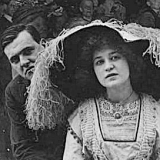|
NGDBSS posted:If you're talking about Anathem, I bounced off that back when it was first published and it turns out that was probably for the best! Someone who's actually familiar with the philosophy dug in and found that it's mostly crankery. I didn't mind Anathem - wouldn't say it was great, it kept me entertained - but that article reminded me about the ninja that suddenly show up so they can have a big Kung Fu fight. I didn't know that Stephenson had come out as a libertarian, had him pegged as a techbros progressive.
|
|
|
|

|
| # ? Jun 4, 2024 21:03 |
|
Yeah, he had a coming-out party and everything. That's the only way to know the political and philosophical ideas of someone who writes thousands and thousands of pages expressing them.
|
|
|
|
Just finished Harpo Speaks! by Harpo Marx and Rowland Barber, with afterwords by Susan Marx (his wife) and William Marx (Harpo's eldest son). The book spends little time on Marx's film career and instead could be broken up into three parts; his childhood in Manhattan at the end of the 19th century and life in vaudeville with his family before his rise to fame, his time with Alexander Woolcott and the rest of the Algonquin Round Table, and finally his life as a family man.
|
|
|
|
The Phantom Atlas: The Greatest Myths, Lies and Blunders on Maps by Edward Brooke-Hitching A coffee table book about various fake islands and continents. Not much text but lots of period maps and other illustrations. I worked my way through it a few sections a day, most of which aren't longer than four pages, while reading other books.
|
|
|
|
White Coke posted:The Phantom Atlas: The Greatest Myths, Lies and Blunders on Maps by Edward Brooke-Hitching Which fake was your fav?
|
|
|
nonathlon posted:I didn't mind Anathem - wouldn't say it was great, it kept me entertained - but that article reminded me about the ninja that suddenly show up so they can have a big Kung Fu fight. I didn't know that Stephenson had come out as a libertarian, had him pegged as a techbros progressive. I liked anathem a lot but Iím a sucker for narratives that discuss pedagogy and science history and stuff like that. Stephenson worships billionaires and is rich himself so it makes sense that heíd be a libertarian as well. tuyop fucked around with this message at 04:20 on Oct 15, 2021 |
|
|
|
|
lifg posted:Which fake was your fav? The Sea of the West. Itís related to the Northwest Passage but instead asks ďwhat if the Midwest was water?Ē
|
|
|
|
White Coke posted:The Sea of the West. Itís related to the Northwest Passage but instead asks ďwhat if the Midwest was water?Ē 
|
|
|
|
The_Other posted:Just finished Harpo Speaks! by Harpo Marx and Rowland Barber, with afterwords by Susan Marx (his wife) and William Marx (Harpo's eldest son). The book spends little time on Marx's film career and instead could be broken up into three parts; his childhood in Manhattan at the end of the 19th century and life in vaudeville with his family before his rise to fame, his time with Alexander Woolcott and the rest of the Algonquin Round Table, and finally his life as a family man. When it came to his film career he didn't have anything to say.
|
|
|
|
I just finished Blackwater: The Complete Saga by Michael McDowell which was 700 pages of not what I expected. I think my main takeaway is that I went in expecting a Horror novel, but the parts I enjoyed of it the most were about as far removed from 'Horror' as a Novel can probably be - not to understate the unsettling moments that are interwoven throughout brilliantly. And that's not what I expected - I came to appreciate each and every character in this book and their part in the story as a whole a lot more than I anticipated I would when I first started reading it, especially considering it's a book about some rich folk from Alabama. But, Blackwater is at its best with the members of the Caskey family going against one another in the ways only family can. Each one of them is likeable (even if that likeability is in the way I came to hate them) and more than one made me think of someone I know or have known, for good or bad. That all of the family drama and their upward mobility is interspersed with a lot of peculiarity and strangeness is even better, particularly with how that strangeness or other worldliness interacts with the more real and all too familiar aspects of the Family drama. Blackwater is really good, is what I'm trying to say.
|
|
|
|
Neat. My favorite phantom geographical feature that didn't get its own article is the Dragon's Tail. It grew, or rather shrank, out of the idea that the Indian Ocean was actually a land locked sea. Once it was determined that that wasn't the case the Dragon's Tail stuck around because map makers thought there had to be some kind of landmass that was mistakenly believed to extend further than it did. You also see the idea linger around on Africa too, with eastern Africa extending out horizontally to create a pseudo enclosure. After Columbus some maps tried to stick the Americas onto Asia with Mexico becoming the Dragon's Tail but that didn't last long. For one it meant there was nowhere to put Japan.
|
|
|
|
Just finished Burr by Gore Vidal. It's a fun historical fictionty biographical thing, with a lot of humanizing Inside Baseball bits about the figures of the Revolutionary War. The main character being a writer is often sort of a red flag for me -- Writers writing characters who write about writing is one of my pet peeves -- but Narrator Charlie is fairly likable and not particularly prone to naval gazing. Burr himself is an interesting character to read about, since he's such a weird grab bag of known idiosyncrasies and unknown motives, though his charmingly polite tune of "Everybody Else Was an Idiot Except for Me, Who Was the Best But Got No Credit" starts off audaciously funny and ended up rubbing be raw by the end. All in all it was a terrifically interesting look into the zany posh-but-violent politics of the day that eventually wore out its welcome with me by the end.
|
|
|
|
Funny, Iím about halfway through Burr myself. Did you also start reading it after seeing Hamilton?
|
|
|
|
White Coke posted:Funny, Iím about halfway through Burr myself. Did you also start reading it after seeing Hamilton? Well, I started it because I really liked Creation by Vidal, which I picked up on an audible sale, but when it came time to try another Vidal book, Hamilton definitely influenced the decision.
|
|
|
|
Sinatrapod posted:Well, I started it because I really liked Creation by Vidal, which I picked up on an audible sale, but when it came time to try another Vidal book, Hamilton definitely influenced the decision. Itís interesting to compare the two portrayals because they seem to agree to agree on a lot of character details, but come to different conclusions.
|
|
|
|
Funny, I just finished Chernow's Hamilton the other night, which was the the biography/hagiography basis for the musical. I read Grant a while back and really enjoyed it, I thought Hamilton wasn't quite as good. Maybe because the tone Chernow takes makes more sense given the Grant slander that is a major piece of the Lost Cause mythology and still persists, vs the (legit) slander that Chernow defends Hamilton against is generations old at this point and no one gives a poo poo. Like, I don't need you to keep defending Hamilton from claims he was a monarchist. I get it. As a writer Chernow still does a great job of crafting a narrative and bringing historical figures to life. The timelines feels more herky-jerky but that is probably because Hamilton always had like 6 things in the fire, so it's hard to tell any story chronologically. You kinda always have to jump around. In particular I appreciate that he did what he could to give the wives of the founding father's as much voice as he could, its frequently forgotten how resourceful, intelligent and influential the women of the early days of the republic really were. There just isn't as much surviving primary sources but it was probably the best view into that that I've read. Vidal's Burr sounds interesting but I think I need to back off from the 18th century for a little while I think. I was interested in Chernow's Washington but, man. It's like 2x as long as Hamilton and I am not sure how much I want to wade into that hero worship.
|
|
|
|
Neil Gaiman's Norse Mythology narrated by himself. A collection of Norse mythology stories as told by Gaiman. Before reading it I was just vaguely knowledgeable of Norse mythology from everything I had picked up in other media. The stories are short and easy to follow and the narration was very good, especially considering not all authors can do it well. I recommend it if you like folk stories or just want to know more about it. Devolution by Max Brooks narrated by a full cast. Story about the fictitious "Greenloop Massacre" presented through a collection of recovered journal entries and interviews. Greenloop is a mostly self-sufficient "smart" community located near mount Rainier in WA. It gets cut-off from the rest of the world when Rainier erupts and its inhabitants are forced to use anything at their disposal to survive. Everything turns for the worse when a group of sasquatches starts appearing. The narration was excellent and Judy Greer who is the main character does a great job. If you've read World War Z it is by the same author and has a similar format but it is a contained story rather than jumping all around the world. This makes it a lot more personal and gives a different vibe because the characters actually have arcs.
|
|
|
|
White Coke posted:Itís interesting to compare the two portrayals because they seem to agree to agree on a lot of character details, but come to different conclusions. Yeah. And I think I can definitely understand why, after a book, a musical and a fair bit of background history reason I think I've basically come to the conclusion that nobody really understood Burr except maybe his daughter? Dude basically dodges every label you try to cram him into, with the exception maybe of "bad with money". Lockback I think what you should do is pick up both Burr and Washington and alternate chapters. Approximately half of Burr is an extended diss track on basically every one of the Founding Fathers (with the rare exception of Benedict Arnold, who comes off with positive reviews, lol) and Washington especially can never do anything that Burr approves of. They can palate cleanse for each other!
|
|
|
|
1,000 Books to Read Before You Die by James Mustich has been an albatross around my neck for well over a year now, though I can't blame Mustich for that. There's not much about this book that I can recommend in comparison to Peter Boxall's 1,001 Books. Mustich's focus is broad enough to include nonfiction, poetry, plays and books for very young children (I picked it up for the nonfiction recs.), and it is kind of impressive that the entire thing is one man's opinion rather than Boxall's collaborative project. For the most part, though, Mustich's descriptions of his favorite works don't really make me excited to read them, and his inclusion of The Da Vinci Code and Atlas Shrugged throws everything else into question. By contrast, Boxall's book is the main reason I became interested in literary fiction; it showed me just how broad, varied and enticing the world of books is. My purchase of Mustich's book coincided with my decision to sort my collection of over seven thousand Kindle samples into length categories for an easier browsing experience (in theory), and I decided to alternate between the two. This is the main reason I haven't finished any other book this year, but now I'm done, and hopefully I can focus on more productive or fun things now. Solitair fucked around with this message at 15:24 on Nov 4, 2021 |
|
|
|
Creatures of Light and Darkness by Roger Zelazny. Hot garbage. OK let me be more specific: its a desperately overwrought exercise in creative writing that is disjointed and very misogynistic. Presumably its a retelling of the Egyptian cycle of life and death, except its not as it has appearances of gods from Greek and Norse mythology as well thrown into the mix. Also whatever the gently caress the Steel General is. It was a gift from a Secret Santa past, but this does not cast any shade! I asked for examples of both Zelazny and Lem! So this is on me. Disappointing considering his reputation. (Lem on the other hand is utterly fantastic!). I still have a couple of other Secret Santa books still to go, all of which have been very informative of various genera/genres of books--scifi, fantasy, horror, southern gothic. All of my past Santas have hit it out of the park! PS: Join the Secret Santa today! https://forums.somethingawful.com/showthread.php?threadid=3982810 Bilirubin fucked around with this message at 03:51 on Nov 4, 2021 |
|
|
|
|
ReDawn by Brandon Sanderson & Janci Patterson. It's a novella that's part of a larger sci-fi series that takes places after humanity fought, and then lost, a war with a bunch of aliens. A small group of humans crash lands on a planet that barely allows them to survive, and aliens keep attacking them to "manage" them and prevent their development. In ReDawn, humans have just figured out how to escape the planet and are meeting aliens for the first time, and learning about what's going on in the galaxy they've been cut off from, and have to decide if they want to continue the fight or give in and live as a "lesser" species. All in all it was an enjoyable story, though there were parts of it that I found a bit too contrived/convenient.
|
|
|
|
Is it from the Skyward series?
|
|
|
|
Yes, it's a miniseries set between books 2 and 3. The last one is set after book 3 and comes out in December. Also, Spends isn't the main character.
|
|
|
|
Friends, today I can offer you a free ARC (Advanced Reader Copy) of the book Conquest For Eternity with no less than 490 pages. Itís full of action and highly entertaining. The only thing I ask is an honest review on Amazon and Goodreads. Send me a message if interested. Eternal Destiny fucked around with this message at 13:02 on Nov 8, 2021 |
|
|
|
I just finished Love's Falling Star by B. D. Grayson, which is their debut novel - although the blurb at the end of the audiobook mentions that they used to write fanfiction. It's a really sweet story about two women falling in love, and the struggles of coming out as a country music star. Obviously, that's not new territory, but I think that despite the fact that it's a story set in modern times, it's a pretty honest look at how difficult it can be (though I guess I would've liked the book to acknowledge that even country music singers have been coming out since the very early 90s, and still had a very successful career afterwards). I also absolutely adore the ending, which had me crying. The only real feedback I would offer, if asked, is that the book doesn't really do a good job of showing how much time passes. Oh, and the other bit of feedback I'd have is that the book is too short. I definitely look forward to see what the author does next, because judging from this first professionally published book, they've definitely got talent for writing believable stories.
|
|
|
|
|
Eternal Destiny posted:Friends, today I can offer you a free ARC (Advanced Reader Copy) of the book Conquest For Eternity with no less than 490 pages. Itís full of action and highly entertaining. What's the dust cover synopsis?
|
|
|
|
I finally finished Damned Nations: Greed, Guns, Armies, and Aid by Samantha Nutt. I actually got this book when it came out in 2011 (Samantha Nutt was doing a book tour/speaking event at my university), but shortly after I started it life kinda got in the way, then I had to move. But I went back home for Thanksgiving last month, and found my old copy with the bookmark still there. The book is not quite a biography, though Nutt does use her experience as an aid worker several times to highlight what's going on in the world. It's more a mix of stories, both personal and anecdotal, back up by historical and statistical events/data. Nutt's critical about how aid is spent not to help people but to give photo ops for politicians, about the voluntourism industry, which does a lot more harm than good, and how many large, international charities are kinda a waste (at least compared to smaller local ones that are more focused). Also, how tying aid to the military has had major blowback for actual aid work (and workers). It's also a bit prophetic when, at the end, she talks about Afghanistan and Iraq, and how the aid money wasn't being used to actually build anything but just kinda disappeared, or how the governments put into place and propped up by western powers are were failing their duty, because of corruption and how they alienate the populace, do not provide opportunity for their people to become educated or find employment. Not that she predicts the collapse of the Afghan government (or that she's even the first to point this out), just that as it was the situation was inherently unstable. The book was interesting. I wouldn't say it was a fun (as in, amusing) read, but I did enjoy reading it and learning a bit more about the world of international aid.
|
|
|
|
I read mostly random books from my library. The last five:
|
|
|
|
The Coming of Amos (William. J. Locke, 1923) Davidís brother Tom is an Anglican Bishop (perhaps one that doesnít especially care about religion all that much) and his sister Dorcas rather unexpectedly (or maybe exactly because of Tom) married a hellfire and brimstone preacher and left for the wilds of Australia. David took up painting and spends most of his time in Cannes. Heís currently painting Nadia, whoíd once been a Russian princess and only narrowly escaped the revolution with her life. Then Amos arrives. He seems to be Dorcasís son, and further, Dorcas seems to be dead. This is news to David. Having not previously accounted for being mortal, sheís made no plans for Amos and so sends him to David to learn the ways of the world outside the cattle ranch. Amos is very much Dorcasís child and his morality is of the unyielding kind. Heís about 25 and has been entrusted to David for five years. Adjustment to the French Riviera is difficult but he will do quite anything to aid Nadia. Nadia is caught in a bit of a pickle. Sheís staying with her only relatives in the world who also happen to be gambling thieves. Ramon Garcia, not his real name, is a fraudster as well, but he threatens lawsuit against Nadiaís relatives for pawning off a string of fake pearls on him instead of his winnings. Nadia sort of married him to keep him quiet, but that only made everything so much worse. David finds himself in love with Nadia and he certainly tries to help in his bumbling, middle-aged way, but is at a loss for what to actually do. Amos takes the bull by the horns, breaks into Garciaís hotel room, and threatens him with grievous bodily harm if he doesnít turn over the fake pearls and Nadiaís letters regarding them, which heís been using as blackmail. Turns out, it was all a flimflam. The letters were long ago destroyed and he pawned off the pearls on an even bigger sucker. The situation seems almost resolved when Garcia suddenly goes for his gun. A scuffle ensues, and itís hard to be definite, but Amos is not seriously shot in the shoulder and Garcia falls six floors down to the pavement below. The police, having had quite enough of Garcia, are inclined to consider it suicide. Amos sees little use in Anglicanism, nor any of the other Protestant sects heís sampled. He nearly took orders as a Dominican monk, but backed out, trying instead Eastern Orthodox after marrying Nadia. Inscription: Signed Elizabeth Willis on the front end paper.
|
|
|
|
The Affair at Flower Acres (Carolyn Wells, 1923) A convoluted story. Raynor is shot to death in the sun room. There are doors to the room on each of the four sides and people standing in each of those doors. One of them had to do it. At one door is his wife Nan, who he tricked into marrying him by claiming her father was a forger. At the opposite door is Finley, just returned from two years in Japan, madly in love with Nan. At another door is a nurse who Raynor once tried to murder and who has been poisoning him with arsenic. And finally at the forth door is Nanís brother Orry. And letís not forget that Raynor is addicted to morphine and growing increasingly erratic and uncontrollable The solution is as convoluted. Nan has secretly been slipping atropine into Raynorís tea to counteract the morphine. Orry spotted this and, noticing the unmistakable symptoms of arsenic poisoning, thinks Nan is trying to kill her husband. So he shot him. I think I breezed over it too lightly, so let me say again: The nurse Raynor is employing as his dietician is a woman heíd previously tried to murder. Thereís business about a hidden will and blackmail, too, but the story is complicated enough as it is. No inscriptions.
|
|
|
|
The Case of the Fan-Dancerís Horse (Erle Stanley Gardner, 1947) Lois Fenton, a fan dancer, loses both her favorite set of fans and her horse, Starlight, when she leaves her husband, John Callender, to go back to the fan dancing circuit. Previously, sheíd been impersonated by Irene Kirby, who took her bookings and danced in her place. This was with Loisís blessing ó no reason not to allow an aspiring fan dancer a break ó but it was a clause of the contract they signed that, if Lois ever intended to return to dancing, Irene had to step aside. Trouble is, John has that contract in his keeping and neither of them had a foresight to make a copy. Perry Mason has found the fans in the wreck of an old Mexican womanís car, but he doesnít know anything about the horse. One night, in his hotel room, John is killed ó stabbed to death with a katana heíd brought with him for some reason. Three people had been to see him since Mason put the room under surveillance: Irene, Lois, and Jasper ó Loisís brother, whoíd embezzled thousands from John and whom John was using as leverage to force Lois to come back to him. It looks bleak for Joan because Irene claims to have spoken to John at two-thirty-something, then Joan saw him, then nobody else. He was found dead by the hotel staff in the morning. Unusual for Perry Mason in that most of the story is a red herring. It comes down to that fact that Irene is lying about the phone call. She didnít kill John, but he was already dead when she arrived. The time she spent in the room with the corpse was spent vainly searching for the contract, which she wanted to destroy. Indeed, the last person to have seen John alive was Jasper. When Jasper met him at two oíclock, heíd come to beg for a little more time repay the money heíd stolen. John refused. He didnít care a fig for the money, he wanted Joan, but he was more than willing to send Jasper to jail if he didnít get her. It was a crime of passion ó Jasper simply saw the sword on the bedside table, snatched it up, and plunged it into Johnís chest. Inscriptions: Discarded from the State School for Girls in Hallowell, Maine in 1957. Didnít keep it very long. I find most libraries hang onto books for 75-100 years so long as theyíre in good shape, and this one is. Ortho fucked around with this message at 12:42 on Nov 14, 2021 |
|
|
|
Sleeping Murder (Agatha Christie, 1976) Gwenda, newly married to Giles, arrives in England ahead of him to buy a house. She was born in India and grew up in New Zealand but is drawn to one particular house in the tiny coastal town of Dillmouth. Thatís because it was once her house. She had entirely forgotten, but when she was four years old she did briefly live in England with her father Kelvin and step-mother Helen. She begins remembering some things ó just disconnected flashes. One of them disturbs here: itís Helen strangled to death at the bottom of the stairs. She and Giles, now arrived, are all for investigating the mystery. Miss Marple warns it would be best to let sleeping murders lie. Stirring up the past too much can be dangerous. The book doesnít have any of the hallmarks of a Miss Marple story. Thereís no drawing comparisons to events or people in St. Mary Mead and extrapolating them to the current situation. Indeed, you could quite easily cut Miss Marple out of the story altogether and it would play out exactly the same. She doesnít do much. The solution seemed clear as day to me when they read Kelvinís diary, who reported that he felt like he was being drugged. Who could have done that? Thereís only one man who could do it and heís conveniently next door, and with him being the murderer, that would perfectly account for Helenís fear and desire of running away. No inscriptions.
|
|
|
|
Orlando Furioso (Ludovico Ariosto, 1532) A chivalric romance combining the matters of France (the legends surrounding Charlemagne) with the matters of England (Arthur and Merlin). Orlando Furioso is a very, very long poem covering very, very many events, but boiling it down to its most basic level: Orlando and Rinaldo chase after Angelica, who rather doesnít love either of them; Bradamant chases after Ruggerio, who does love her (if somewhat inconsistently) but a wizard named Atlas keeps catching him in enchanted traps; sorceress Melissa drawing on the magic of Merlinís bones commands an army of holy demons to aid Bradamant; and all the while Agramant, the King of Africa, wages war against Charlemagne ó a war Charlemagne will surely lose unless he gets Rinaldo back on the field from wherever heís traipsed off to this time. Although Orlando is our title character, the focus is on Bradamant and Ruggerio. Itís almost at exactly the halfway point that the promised furioso arrives and Orlando is driven mad after learning Angelica married someone else. At that point he strips naked and rampages across Europe killing everyone who gets in his way until Astolfo flies to the moon to recover Orlandoís lost wits, but until then, heís mostly out of the story. As Melissa prophesied in the cave, Bradamant and Ruggerio do eventually marry ó the latter converting to Christianity so it will be recognized. I kind of love Orlando Furioso. This is the third translation of it Iíve read, a prose version by Guido Waldman. I think it might be my favorite. Verse translations by necessity have to take liberties with the text to fit the rhyme and meter. In prose, you can do it straight. No inscriptions.
|
|
|
|
dustin.h posted:Orlando Furioso (Ludovico Ariosto, 1532) That sounds amazing, buying a copy now.
|
|
|
|
Fighting Trousers posted:Just finished Micaiah Johnson's The Space Between Worlds which had some really cool ideas and an enjoyable protagonist (not necessarily *likeable*, but enjoyable), but ultimately the book just felt kind of underdone. I felt the same way about Worlds. Itís a really interesting premise but the author decides to focus on the boring parts for some reason. It was good enough to keep reading but bad enough to annoy me with what seemed like missed potential.
|
|
|
|
Recently finished reading The Three Hundred Year War: A Chronicle of Ecological Disaster by William O. Douglas, which is a non-fiction book about climate change, and man-made inflicted ecological disaster on the planet Earth by corporations and lax environmental protection efforts as of 1972. https://www.goodreads.com/book/show/2821859-the-three-hundred-year-war The Three Hundred Year War covered a bunch of stuff like endangered species as of 1972, various massive ecological disasters caused by pollution/urban development/natural resource extraction and not quite commercially feasible green energy technologies as of 1972 (solar energy panels, oceanic heat exchange engines, etc). Back in 1972 the EPA (aka United States Environmental Protection Agency) was not quite 2 yrs old at that point, and had just started finally funding a bunch of environmental study programs/animal extinction conservation efforts/research projects. The Three Hundred Year War is of note mostly because the author, William O. Douglas, was a sitting US Supreme Court Justice when it was written, and William O Douglas was extremely angry in the book about all the ecological disasters and wanted remediation efforts started asap globally. Which is a massive change from how current US Supreme Court Justices feel, given the 2021 US Supreme Courts recent decision about possibly limiting the EPA's power to enforce regulations. cough, cough. https://apnews.com/article/climate-immigration-us-supreme-court-environment-pollution-4b0f64e31957603abd5e938092ffd52a
|
|
|
|
dustin.h posted:Orlando Furioso (Ludovico Ariosto, 1532Ů Do you have a recommended physician edition? Iím reading Paradise lost and all the footnotes make it sound like Iím losing out by not reading Orlando.
|
|
|
|
dustin.h posted:Orlando Furioso (Ludovico Ariosto, 1532) But did you know the medievals made a proto-D&D about this? https://www.youtube.com/watch?v=f20rpBU_QYo
|
|
|
|
A Red Death by Walter mosley. I'm doing a bit of a noirvember thing, and I've been reading noir/detective/crime books and the last one I finished was the second book in the Easy Rawlins Mysteries by Walter Mosley. I don't have much experience with noir but I can see that Mosley made a refreshing take with his characters. It has some great lines and I love that Easy, the main character is not an untouchable bogart-type, but a vulnerable three-dimensional person, who can be tough when needed, but also humanly fallible.
|
|
|
|

|
| # ? Jun 4, 2024 21:03 |
|
Global Crisis: War, Climate Change & Catastrophe in the Seventeenth Century by Geoffrey Parker. It's about how much things sucked in the 17th century. They were really bad. Along with all the obvious problems such as war, disease, and climate change, a common problem was that there were too many college graduates.
|
|
|







































